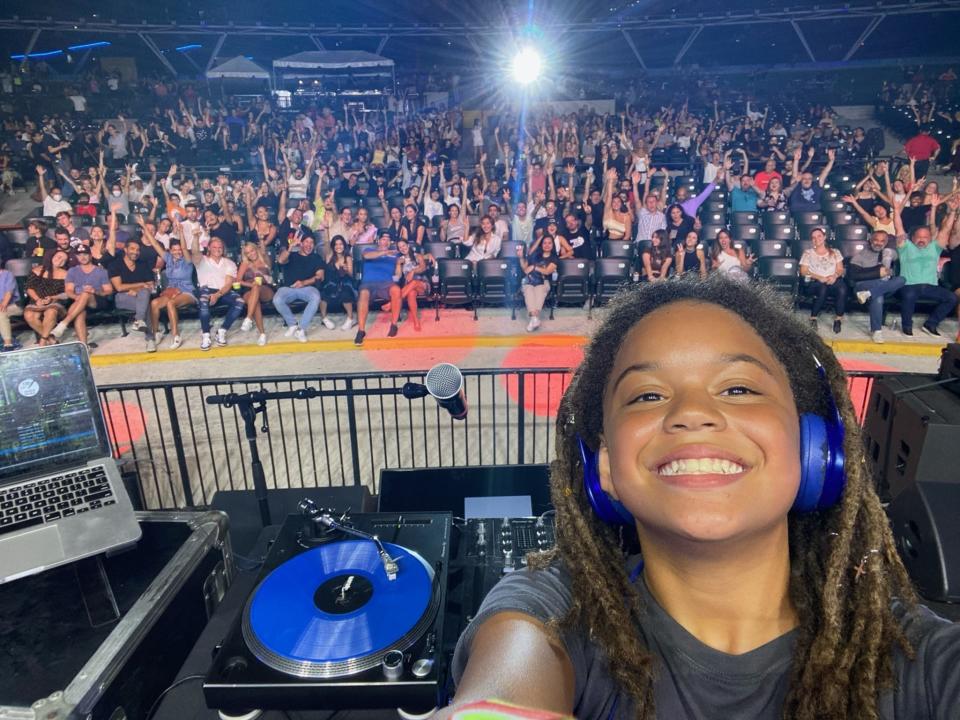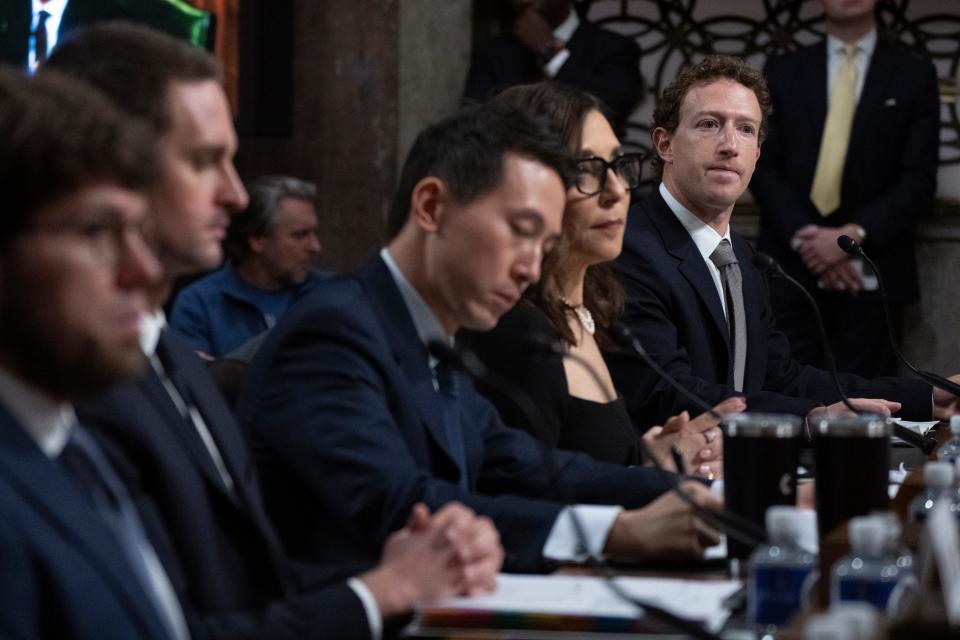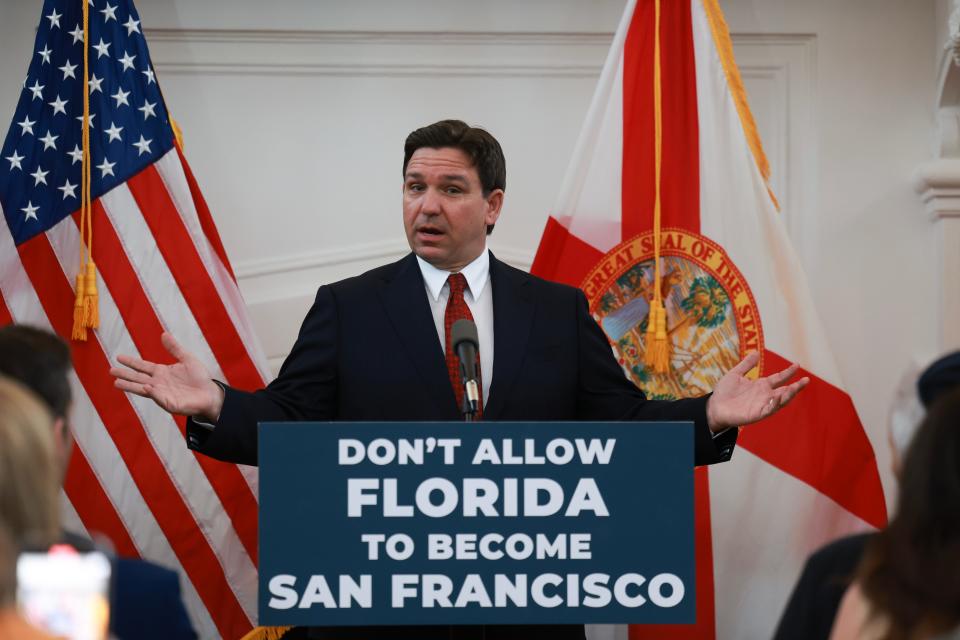Florida lawmakers want to ban social media for minors: 'Woke' censorship or safety?
Marley Desinord spins her records on the turntable, cranks up the volume and lets the music soar.
She dances. She twists. She finger-punches the air to the beat.
Her iPhone records the moment for a video that she will share with friends, classmates and her 111,000 TikTok followers.
Marley has been showcasing her DJ skills on social media since she was 8. Now, at age 13, it's more than her TikTok career that is in danger of ending prematurely because of a proposed Florida state law that would ban her from the digital platform that put her on the map.

She and a whole generation of kids her age who chat, snap and stream on social media would be cut off from a huge part of their lives.
Under legislation known as HB1 and SB 1788, social media platforms would prohibit Florida minors from creating new accounts, terminate existing accounts of those younger than 16 and use age verification for account holders, without a parental permission exemption.
The move is Florida legislators’ latest battlefront in an all out culture war that is seen as a bellwether for the rest of the country. Spurred by Gov. Ron DeSantis, the state has led the charge in passing book bans, limiting the use of public funds for diversity initiatives and restricting the discussion of sex and gender identity in schools.
One of the bill’s sponsors, Fiona McFarland, a Republican, has said this legislation is imperative to shield kids from what she called “digital fentanyl.” For her and others, the ban is necessary to protect minors from cyberbullying and social media addiction. Lawmakers backing the legislation also say they want to safeguard privacy, arguing there are plenty of instances where “the state takes over parental rights” to keep kids safe.
“We don’t give you a parental right for your kid to buy alcohol or tobacco under the legal age, or to drive a car,’ McFarland said in an interview with USA TODAY. “We are putting social media, as a product, on the same level as all of these other harms that are inappropriate for children.”
Opponents, however, consider the bill a wolf in sheep's clothing, aimed solely at preventing kids and teens from online content considered too woke.
The vote to ban young people under 16 from having social media accounts even with parental consent shows that the claim of parents rights is “just a cover for censorship,” Howard Simon, interim executive director at the American Civil Liberties Union of Florida, said in a statement.
More: Did Republicans take over school boards? Key education takeaways from the 2022 midterms
What is Florida’s bill?
When Marley goes to class in South Florida, she abides by her school’s strict no phones policy.
But when she returns home, she checks the comments on her posts and sees who may have slid in her DMs. Surely, that’s par for the course for any content creator. But it’s also a normal after-school activity for tweens and teens.
Many of Marley’s posts are her mixing hip hop artists like Lil Nas X and Nicki Minaj. Interspersed are posts about her and her brother watching basketball games, her friends celebrating the start of summer vacation and even advocacy about teen suicide prevention.
Like many other young people, Marley also uses social media to connect with friends. She follows and messages other teenage girls interested in music production across the country.
“We really just empower each other and support each other,” Marley said. “Without social media, I wouldn’t have even found out about them and they help me a lot.”
While people of all age groups use social media, it has an outsize role in the lives of young people. A Pew Research Center 2023 survey found that a third of U.S. teenagers use at least one of the five dominant social media platforms almost constantly. And 54% of teens say it would be difficult to give up social media.
Using social media is not inherently beneficial or harmful to young people, according to a health advisory from the American Psychological Association.
But, like Marley, Florida kids could soon lose access to presumably millions of accounts.
If the bill passes, social media companies could be fined up to $10,000 per minor account they fail to terminate.
David Greene, civil liberties director of Electronic Frontier Foundation, a digital rights nonprofit based in San Francisco, said book banning informs how these efforts should be looked at.
Laws that seek to protect kids from pornographic, obscene and harmful content are being used to restrict a far wider range of materials, the attorney said.
“It’s really important to push back on equating information, which is what minors get over the internet, with a drug, a physiological harmful substance,” said Greene.
There are also growing concerns about how the age verification process would work, likely requiring the use of facial recognition software or third-party data brokers. Greene argues both present privacy concerns.
"If enacted, it will jeopardize the privacy and security of Floridians who use the internet," Carl Szabo, NetChoice's vice president and general counsel, previously told reporters. “The Free State of Florida deserves better than a massive, unconstitutional internet surveillance program.”
In response, bill sponsors Michele K. Rayner D-St. Petersburg and Tyler Sirois R-Merritt Island said those privacy concerns should be alleviated by the bill’s language mandating age verifying information is not used for any other purpose.
More: Americans don't trust social media companies. Republicans really don't, new report says.
Parental rights and social media
Marley's parents used to fully manage her social media accounts and now continue to monitor her use. Marley's dad, Rodney Desinord sees the sweeping legislation in Florida as actually stripping their rights as parents by completely banning minors from social media even if they have their parents’ permission.
“She understands how to be responsible,” he said.
Desinord, 43, a fourth grade teacher in Pompano Beach, finds the bill hypocritical, considering the state’s support for book bans.
“The argument for the book ban is that parents should have the right to choose, but on the social media ban, they’re not being given the right to choose,” Desinord said.
For Sirois, the ban is directly responding to parents’ concerns about social media companies.
“We’re dealing with a problem here that I think every parent, every family has encountered,” Sirois said. “The bill, I think, most importantly empowers parents to sue a social media company that has unlawfully registered a minor.”
Last October, 33 states sued Meta, the umbrella company for Facebook and Instagram, alleging the platforms are knowingly harming children’s mental health.
Congressional hearings and state regulation attempts nationwide have added to building widespread pressure to hold social media platforms accountable.

It’s the reason Rayner, a Democrat, supports the initiative despite pushback from progressive Democrats who view social media as an important space for marginalized youth.
“This is less about parental rights and more about sending a message to these social media companies that you are not going to continue to do nefarious things,” Rayner said.
More: Parents Bill of Rights Act passes House in latest salvo of culture wars
Does Florida's ban violate the First Amendment?
Florida’s bill goes further than similar social media bills in Montana, Ohio, and Utah.
The bill is similar to an Arkansas law banning those under 18 from using social media. That measure was blocked by a federal judge in August who said it violated the First Amendment stopping it from taking effect in January.
As a result, DeSantis said he has concerns about the bill’s reach. He and his wife do not allow their children on social media but acknowledged other states’ legal challenges when trying to implement similar bans.
“Not to say courts are always right about this, but anything I do, I want a pathway for this to actually stick,” DeSantis told reporters at a press conference. “To say that someone that is 15 just cannot have it no matter what, even if the parent consents, that may create some legal issues.”

In the past when DeSantis and Florida have taken on culture war issues the impact has poured into other states.
Florida led the country in book bans during the 2022-23 school year, accounting for over 40% nationwide, according to a report by PEN America. The report recorded 1,406 book ban cases in Florida, followed by 625 in Texas, 333 in Missouri, 281 in Utah, and 186 in Pennsylvania.
Florida’s series of anti-LGBTQ youth laws has had widespread impact. In 2023, the ACLU tracked 510 anti-LGBTQ bills in the U.S.
Democratic political organizer Elijah Manley was one of those who expressed disappointment over Florida House Democrats’ support for the bill online.
Manley questioned Florida politicians' sincerity in wanting to protect children and instead alleged the bill may be in response to the amount of progressive political views shared and organized by Gen Z users on social media platforms.
A 2022 poll from The Associated Press-NORC Center found that 93% of Gen Z get news from social media weekly.
Manley said young people’s growing support for a cease-fire in Gaza, for example, is informed largely by information they see on apps like TikTok and Instagram.
More: 2 freed Israeli hostages 'back home' with family kidnapped from safe room: Live updates
“Biden can’t win without Gen Z,” Manley said referencing the November general election.
Mitchell Kaplan is a board member of the National Coalition Against Censorship, founder of Florida-based bookstore Books & Books, and a former high school English teacher.
Kaplan sees the bans as a “cynical” attempt by politicians to hold onto power. He said politicians can shore up a base of voters by limiting what people read and denying access to a variety of voices.
“It’s a very multi-faceted attack on democracy” under the guise of parental choice, Kaplan said. “If it was true parental choice, then the law would not permit one parent to make a decision for millions of parents.”
The bill remains in Florida’s legislature and is expected to be taken up for a vote as early as this month.
Meanwhile, Marley is determined to keep making content for as long as her account is active.
Her latest Instagram videos shows her DJ setup at a Miami Heat game she performed at last week. But she's also making fun of herself being a young teen.
Right before that same game, she took a free-throw shot and missed the hoop altogether.
"It was at this point I knew I missed up," Marley wrote with weary emoji. "Wise man once said, 'You can't be great at everything Marley.'"
Rachel Barber is a 2024 election fellow at USA TODAY focusing on politics and education. Follow her on X, formerly Twitter as @rachelbarber_
This article originally appeared on USA TODAY: Florida social media ban: DeSantis has concerns about bill's reach

